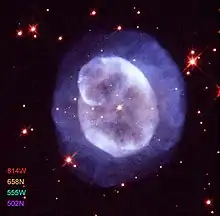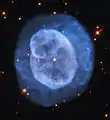| Emission nebula | |
|---|---|
| Planetary nebula | |
 NGC 5979 by Hubble Space Telescope | |
| Observation data: J2000 epoch | |
| Right ascension | 15h 47m 41s[1] |
| Declination | −61° 13′ 05″[1] |
| Apparent magnitude (V) | 12.10[1] |
| Constellation | Triangulum Australe |
| Physical characteristics | |
| Radius | 0.51 ly |
| Designations | NGC 5979, ESO 136-3, 2MASX J15474191-6113079[1] |
NGC 5979 is a planetary nebula in the constellation Triangulum Australe. It was discovered by John Herschel on April 24, 1835.[2] The central star of the planetary nebula is an O-type star with a spectral type of O(H)3-4.[3]
Gallery
 NGC 5979 by Judy Schmidt
NGC 5979 by Judy Schmidt
References
- 1 2 3 4 "NGC 5979". SIMBAD. Centre de données astronomiques de Strasbourg. Retrieved 20 May 2019.
- ↑ Seligman, Courtney. "New General Catalog Objects: NGC 5950 - 5999". cseligman.com. Retrieved 23 May 2019.
- ↑ González-Santamaría, I.; Manteiga, M.; Manchado, A.; Ulla, A.; Dafonte, C.; López Varela, P. (2021). "Planetary nebulae in Gaia EDR3: Central star identification, properties, and binarity". Astronomy & Astrophysics. 656: A51. arXiv:2109.12114. Bibcode:2021A&A...656A..51G. doi:10.1051/0004-6361/202141916. S2CID 237940344.
External links
Wikimedia Commons has media related to NGC 5979.
- NGC 5979 on WikiSky: DSS2, SDSS, GALEX, IRAS, Hydrogen α, X-Ray, Astrophoto, Sky Map, Articles and images
This article is issued from Wikipedia. The text is licensed under Creative Commons - Attribution - Sharealike. Additional terms may apply for the media files.